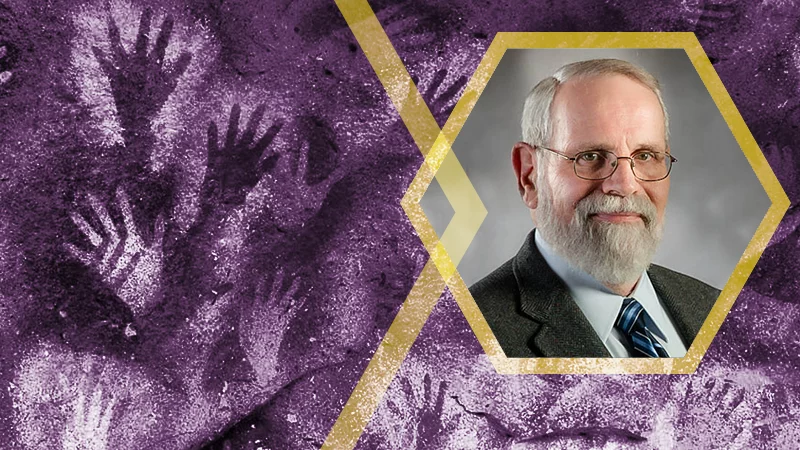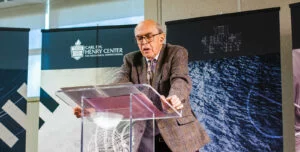James Hoffmeier is stepping away from his lecture podium and beginning retirement—at least for the summer.
This fall he will be joining a group of six other scholars in residence with the Creation Project for the 2018–19 academic year.
The working title of the project is “Why We Believe in Creation and Evolution: A Discussion between an Evolutionary Biologist and an Old Testament Scholar on Human Origins.” This will be done in the form of an interdisciplinary dialogue between Hoffmeier and Janet Siefert, a micro-biologist from Rice University. Their stated aim is to wrestle with how to interpret Genesis 1–2 in a way that is “contextually and theologically responsible in the light of scientific conclusions regarding human evolution.”
Natural & Divine
Like many evangelical Christians, Hoffmeier says he thought for a long time that one has to affirm creation or evolution. Over the years, he says, he came to see that these two concepts or processes (natural or divine) are not mutually exclusive.
“By training, I am an archaeologist; archaeology is supremely interdisciplinary. In my field work and publications, I collaborate with geologists, geo-physicists, paleo-botanists, paleo-zoologists, artists, epigraphers, historians, anthropologists, architects, and so on. I thrive on the interaction of various fields of studies and methodologies all in a quest to answer questions about the past to resolve problems and answer questions. I naturally bring this multidisciplinary approach to my work in Bible and theology.”
Another one of the major questions Hoffmeier’s research is intended to address is where the lines fall between science and Scripture, that is, what are the limitations of each?
“The danger occurs when science tries to answer ultimate questions; but equally problematic are good-hearted Christians who try to use the Bible to answer the questions raised by science,” notes Hoffmeier. “Science can’t answer the ‘why’ or ‘who’ of originsThe danger occurs when science tries to answer ultimate questions; but equally problematic are good-hearted Christians who try to use the Bible to answer the questions raised by science. or creation, but Scripture is not equipped—nor does it seek—to answer ‘when’ and ‘how.’”
Christians have long confessed in the creed that they “believe in God the Father almighty, maker of heaven and earth.” Knowing God as Creator is a central, foundational doctrine and “many doctrines naturally flow from it. One cannot speak of worldview without affirming that God is the Creator.”
Hoffmeier goes on: “I also approach this question set out by in the project from my specialization in ancient Near Eastern religions. Genesis 1–2 was written first and foremost for an ancient Hebrew audience.”
This entails, according to Hoffmeier, a need to understand what God was communicating to the original audience before drawing theological conclusions for today.
“The danger for us modern Westerners is to read these chapters through our modern lenses and contemporary issues rather than starting from the ancient context,” Hoffmeier says. “I am keen to pursue a contextual reading before taking the theological truth offered by Scripture to present-day questions.”
As he mentions, much of this conviction stems from Hoffmeier’s own work in the world of the ancient Near East.
Reading Genesis
“Many of us in biblical studies who approach the Scriptures contextually believe that a lot of philosophers and theologians don’t read Genesis as a Hebrew book written over 3,000 years ago to an audience steeped in ancient Near Eastern cosmological thought,” Hoffmeier says. “With little or no appreciation to the original setting, they quickly move to theological interpretations that may have little or nothing to do with the text.”
Hoffmeier says he finds it unfortunate that “some think there is only one way to do theology,” and he expects his project with Siefert to challenge that way of thinking.
“There are very few who command both science and theology at a high level, so an interdisciplinary dialogue is best conducted between scholars with expertise in their respective areas seeking to find understanding between them,” he says. “I don’t think philosophers and/or theologians have a corner on this market.”
There are multiple ways that the doctrine of creation and human origins can be engaged. Hoffmeier’s proposed research has chosen to focus in part on divine sovereignty, since the two are to his mind inextricably bound together.
“The question of divine sovereignty is a central Christian doctrine. In ancient Near Eastern religions, the godsHopefully this project will be helpful to Christian students and laypeople wrestling with these issues. clamor to be the chief deity, head of the pantheon,” he notes. “This high status is attained by mastering creation; sovereignty stands as the foundation of being to God. The fact that Scripture begins with God creating is an assertion of this mastery over all. So creation and divine sovereignty are inseparable.”
Hoffmeier’s major hope for this project is that it helps the church. Many Christians want to grow in wisdom and biblical understanding regarding the relation between the Bible and science. But many also struggle to accept or outright reject a complementary view—whether they swing to one side or the other, skeptical of science or of Scripture.
“This is precisely why I will be engaged in the proposed research,” Hoffmeier says, “to help such individuals. After 42 years of teaching college and graduate level students, I realize that often people in the church are not the best equipped to help people wrestle with these questions. Hopefully this project will be helpful to Christian students and laypeople wrestling with these issues.”
It’s worth noting that out of those 42 years Hoffmeier spent teaching, nearly half of them were at TEDS, and the impact of that service will be felt in the church for a generation to come. The first half were spent at Wheaton College (with a short stint at Richmond College in Ontario before that). During that time, he has authored, contributed to, or edited more than 20 volumes and written more than 80 articles, not including numerous book reviews and paper presentations.
2018–19 Henry Resident Fellows
2018–19 Henry Fellows Announced | Learn More
James Hoffmeier, “Why We Believe in Creation & Evolution: A Discussion between an Evolutionary Biologist & an Old Testament Scholar”
Fred Sanders, “The Doctrine of Humanity in Systematic Perspective” | Learn More
Dru Johnson, “Man Made: If Biblical Texts Could Speak to Modern Origins Stories” | Learn More
Ryan Peterson, “Human Identity in Theological Anthropology” | Learn More
Mary VandenBerg, “Retrieving a Substantialist Understanding of the Image of God” | Learn More
Ralph Stearley, “Assessing Evidences for Cognitive Capacities in Ancient Hominins, with Reference to their Perception of God” | Learn More
Joshua Farris, “The Soul of Science and Religion: Theological Anthropology, Substance Dualism, and Origins” | Learn More







Comments
Be the first one to make a comment!